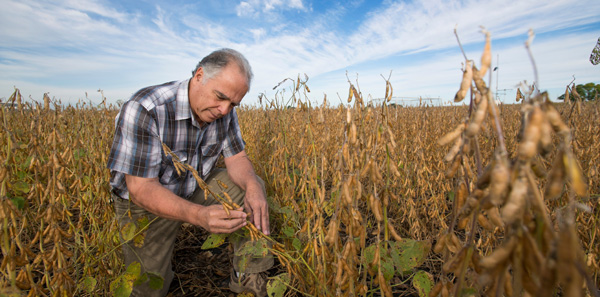
Micronutrients, Macro-Impact on Plant Health
Just like people, plants need nutrients to help them grow. Antonio Mallarino, professor of agronomy, has put together a team of scientists from across the Midwest to better understand how micronutrients aid growth and development of soybeans.
“Micronutrients are nutrients that are essential for crops but are only needed in very small amounts,” says Mallarino. “Those most commonly thought about by farmers are boron, copper, iron, manganese, molybdenum and zinc.”
Mallarino led a team of researchers and extension specialists from five universities in reviewing micronutrient research on soybeans in the North Central region. This included over 200 field trials conducted in five states since 2012.
“Growers often receive mixed messages about soybean micronutrient needs,” says collaborator Carrie Laboski, professor and extension soil scientist, University of Wisconsin-Madison. “To address this confusion, Mallarino assembled and led a team of North Central region colleagues who have conducted micronutrient field trials. The result of this collaboration is a useful, research-based reference soybean growers can use to help improve their profitability.”
The team revealed some specific soil types and plant growing conditions that result in micronutrient deficiencies, which could impact how soybeans develop. They also assessed the value of soil and tissue testing. The team combined the information and prepared a regional publication to help farmers across the Midwest understand the value of micronutrients and make them aware of potential problems with the interpretation of soil and tissue test results.
“Micronutrients for Soybean Production in the North Central Region” (CROP 3135) is available through the Iowa State University Extension Store.
“We try to watch our soils and fertility and feed the crop with just what it needs to be as efficient as possible,” says Pete Bardole, farmer in Greene County, Iowa, and host of one of Mallarino’s test plots. “If we don’t apply things we don’t need, that adds to our bottom line and saves us money.”
Mallarino says additional research is needed from a regional perspective. In Iowa, his research shows necessary micronutrients for soybeans are present in adequate amounts across most of the state.
“Farmers can spend less time and money treating the soil,” says Mallarino. However, northern and western Iowa have iron deficient soils due to high levels of calcium carbonate which cause chlorosis in soybeans. Thanks to the regional collaboration of this project, Mallarino learned of new research in Kansas and Minnesota showing that a new fertilizer seems to have potential to make soybeans grown in iron deficient soils to be more productive.



